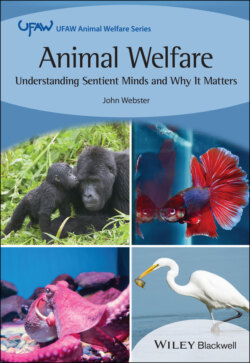Читать книгу Animal Welfare - John Webster - Страница 3
Оглавление
The Universities Federation for Animal Welfare
UFAW, founded in 1926, is an internationally recognised, independent, scientific and educational animal welfare charity that promotes high standards of welfare for farm, companion, laboratory and captive wild animals, and for those animals with which we interact in the wild. It works to improve animals’ lives by:
Funding and publishing developments in the science and technology that underpin advances in animal welfare;
Promoting education in animal care and welfare;
Providing information, organising meetings and publishing books, videos, articles, technical reports and the journal Animal Welfare;
Providing expert advice to government departments and other bodies and helping to draft and amend laws and guidelines;
Enlisting the energies of animal keepers, scientists, veterinarians, lawyers and others who care about animals.
Improvements in the care of animals are not now likely to come of their own accord, merely by wishing them: there must be research…and it is in sponsoring research of this kind, and making its results widely known, that UFAW performs one of its most valuable services.
Sir Peter Medawar CBE FRS, 8 May 1957
Nobel Laureate (1960), Chairman of the UFAW Scientific Advisory Committee (1951–1962)
UFAW relies on the generosity of the public through legacies and donations to carry out its work, improving the welfare of animals now and in the future. For further information about UFAW and how you can help promote and support its work, please contact us at the following address:
Universities Federation for Animal Welfare
The Old School, Brewhouse Hill, Wheathampstead, Herts AL4 8AN, UK
Tel: 01582 831818 Website: www.ufaw.org.uk
Email: ufaw@ufaw.org.uk
UFAW’s aim regarding the UFAW/Wiley‐Blackwell Animal Welfare book series is to promote interest and debate in the subject and to disseminate information relevant to improving the welfare of kept animals and of those harmed in the wild through human agency. The books in this series are the works of their authors, and the views they express do not necessarily reflect the views of UFAW.
